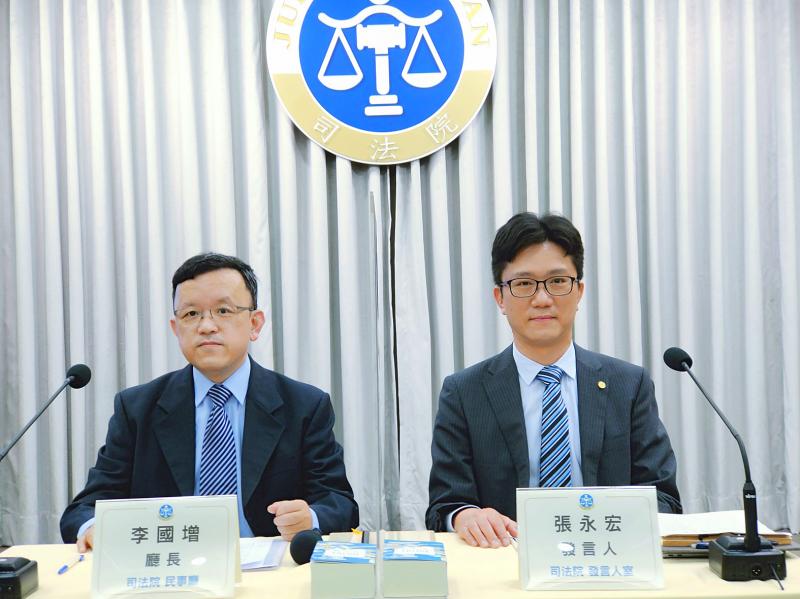The Judicial Yuan yesterday approved draft revisions to a law that would grant recognition to all international same-sex marriages, except for those involving a partner from China, and said it would send them to the Legislative Yuan for review.
The changes would apply to Article 46 of the Act Governing the Choice of Law in Civil Matters Involving Foreign Elements (涉外民事法律適用法), which states that “the formation of a marriage is governed by the national law of each party.”
In practice, this has meant that same-sex couples involving a partner from a country in which same-sex marriage is not recognized are not allowed to marry in Taiwan, or have a marriage conducted in a third country legally recognized.

Photo: Wu Cheng-feng, Taipei Times
The Judicial Yuan said in a news release that it had recommended changing the law to allow and recognize such marriages as long as one of the partners is Taiwanese.
It explained the decision by noting that same-sex marriage is legal in only 29 countries around the world.
Despite its recommendation, the Judicial Yuan said the changes would not apply to couples involving a partner from China, which is subject to separate laws governing Taiwan-China relations.
However, the new rules would apply to couples involving a partner from Hong Kong or Macau, which fall under another jurisdiction, the Judicial Yuan said.
The draft revisions are to be sent to the Executive Yuan before they are jointly submitted by the two government branches to the Legislative Yuan for its review.
The Council of Grand Justices on May 24, 2017, ruled that the nation’s Civil Code provisions that did not allow same-sex marriage were unconstitutional, giving the government two years to amend them.
In May 2019, the Legislative Yuan passed a marriage equality law extending to same-sex couples almost all the marriage rights available to heterosexual couples under the Civil Code.
The law took effect on May 24, 2019, making Taiwan the first country in Asia to legalize same-sex marriage.

A Ministry of Foreign Affairs official yesterday said that a delegation that visited China for an APEC meeting did not receive any kind of treatment that downgraded Taiwan’s sovereignty. Department of International Organizations Director-General Jonathan Sun (孫儉元) said that he and a group of ministry officials visited Shenzhen, China, to attend the APEC Informal Senior Officials’ Meeting last month. The trip went “smoothly and safely” for all Taiwanese delegates, as the Chinese side arranged the trip in accordance with long-standing practices, Sun said at the ministry’s weekly briefing. The Taiwanese group did not encounter any political suppression, he said. Sun made the remarks when

The Taiwanese passport ranked 33rd in a global listing of passports by convenience this month, rising three places from last month’s ranking, but matching its position in January last year. The Henley Passport Index, an international ranking of passports by the number of designations its holder can travel to without a visa, showed that the Taiwan passport enables holders to travel to 139 countries and territories without a visa. Singapore’s passport was ranked the most powerful with visa-free access to 192 destinations out of 227, according to the index published on Tuesday by UK-based migration investment consultancy firm Henley and Partners. Japan’s and

BROAD AGREEMENT: The two are nearing a trade deal to reduce Taiwan’s tariff to 15% and a commitment for TSMC to build five more fabs, a ‘New York Times’ report said Taiwan and the US have reached a broad consensus on a trade deal, the Executive Yuan’s Office of Trade Negotiations said yesterday, after a report said that Washington is set to reduce Taiwan’s tariff rate to 15 percent. The New York Times on Monday reported that the two nations are nearing a trade deal to reduce Taiwan’s tariff rate to 15 percent and commit Taiwan Semiconductor Manufacturing Co (TSMC, 台積電) to building at least five more facilities in the US. “The agreement, which has been under negotiation for months, is being legally scrubbed and could be announced this month,” the paper said,

Japan and the Philippines yesterday signed a defense pact that would allow the tax-free provision of ammunition, fuel, food and other necessities when their forces stage joint training to boost deterrence against China’s growing aggression in the region and to bolster their preparation for natural disasters. Japan has faced increasing political, trade and security tensions with China, which was angered by Japanese Prime Minister Sanae Takaichi’s remark that a Chinese attack on Taiwan would be a survival-threatening situation for Japan, triggering a military response. Japan and the Philippines have also had separate territorial conflicts with Beijing in the East and South China